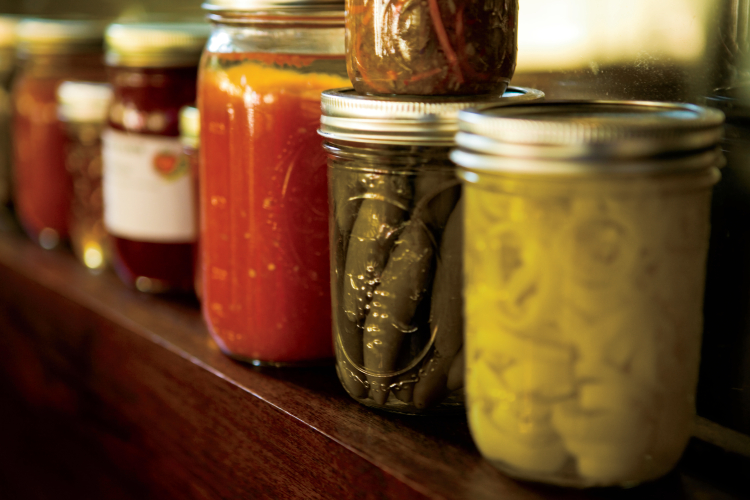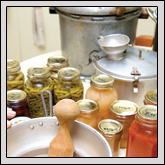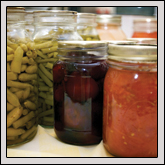You CAN Can! Home Canning Tips From the Experts
Home canning foods can be done in two ways, through a steam-pressure method or a boiling-water method, which is also known as a hot water bath.
Farm Bureau |
If you can grow it, you can can it. Experienced canners know that canning food is a safe and effective way to prevent spoilage and allow families to enjoy home-grown foods long beyond the end of the growing season.
The key to perfectly canned foods is in the home canning process. Improperly canned foods don’t just taste bad, but can also cause serious illness. Many resources providing tips for safe canning methods are available, including recipe books from canning supply companies like Bell, Kerr and Mason, and information and training classes from local extension offices.
Canning foods can be done in two ways, through a steam-pressure method or a boiling-water method, which is also known as a hot water bath. The steam-pressure method is used to preserve low-acid foods, including most vegetables, meats, soups and stews.
High-acid foods such as tomatoes, pickles, fruits and sauerkraut can safely be preserved with the boiling-water method.
The way the two processes work is very similar. Food is packed into jars, sealed and placed on a rack inside the cooker. Each food  requires a specific recipe for preservation and must be held to a proper temperature or pressure for a prescribed amount of time.
requires a specific recipe for preservation and must be held to a proper temperature or pressure for a prescribed amount of time.
“You can’t just put the jars on for 15 minutes and be done,” says Edith Jernigan, a Moore County Farm Bureau member. “Everything has a different time, and you have to be sure each food is at the right temperature.”
Jernigan, a long-time canner, says making sure all her supplies are properly sterilized is the key to safe canning. “I sterilize everything, the jars, the lids, dishcloths—anything I use in the process. It keeps the poison out of the food.”
Davidson County Farm Bureau Member Mary Ruth Sheets advises having steam-pressure canners inspected and tested by a county extension office every year. “It’s always so important to test the cooker,” Sheets says. “You’ve got to be sure you’re dealing with the right amount of pressure.”
In addition to sanitation and proper equipment maintenance there are two barriers to bacteria that are crucial to safe canning—acidity and temperature.
“The acidity of the food determines which process you use,” advises Sally McNeill, family and consumer sciences educator with the N.C. Cooperative Extension in Union County. “There are no shortcuts.”
McNeill uses green beans as an example. “There is no safe amount of time green beans can be processed in a hot water bath. Not three hours or three days.”
Because green beans, like most vegetables, are a low-acid food, it is necessary to can them under temperatures hotter than boiling water. “The only way to get water hotter than the boiling point is to put it under pressure,” McNeill says.
McNeill teaches a home canning class through the extension office and says many who take the class were taught to can by their mothers and grandmothers and know the process, but not why it’s important. The class she teaches is aimed at helping both beginner and experienced canners understand the science behind safe canning.
“I find the ones who have canned for years learn just as much as the ones who have never done it,” McNeill says.
McNeill says experienced canners often take the course to become more comfortable with pressure cookers. “A lot have canned with hot water baths, but stayed away from pressure canning because they’ve heard horror stories about jars cracking or lids blowing off of the canner. But you have to set aside time to can and not be doing other things and you can avoid those problems.”
The canning classroom has been full lately, and McNeill attributes the surge in interest to increased awareness in the origin of foods. “People want to produce their own foods in their gardens, or buy it locally from a farmer’s market,” she says.
Jernigan is a prime example. Her canning begins in her large winter and summer gardens. Every year she grows onions, beans, potatoes, eggplant, squash, cucumbers, turnips and countless other fruits and vegetables with the intention of making the crop last through the year.
“I don’t have to buy much in the way of vegetables,” Jernigan says. “I know where it comes from and what’s on it and that it’s not loaded with preservatives. My husband is 85 years old and the doctor tells him he has the bones and the organs of a 30-year-old, and I think eating good food is part of it.”



We are interested in attending a canning class. Do you have any scheduled during the spring season? We’re in the Greensboro, NC area, but are willing to travel.
Thanks & Happy Holidays!
Don & CJ Foster
I would like to attend a canning class. I live in the Knightdale area do you plan to have any classes within Wake County in 2013? I have never canned before so I need a beginners class.
I would like to attend a canning class, Do you have any scheduled ?
From our garden we have 2 1/2 bushes of onions. Besides freezing caramelized onions like to make onion/bacon jam and use other ingredients beside bacon to make onion jam. Do you have any recipes along with how long to process in a water bath and/or pressure cooker/canner?
Hi Wendy, we don’t have any canning recipes for onions, but here’s some info from the Extension service: http://www.clemson.edu/extension/food/canning/canning-tips/31preserving-onions-garlic.html. Hope this helps!
Jessy Yancey
editor, North Carolina Field and Family
Thank you Jessy Yancey for replying.